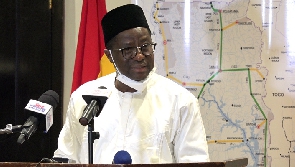Opinions of Friday, 15 June 2012
Columnist: Kwawukume, Andy C. Y.
The In-Filling Policy From An Nkrumaist Perspective
In this short piece, written before the recent announcement of the “moratorium” by government on the sale of public lands, I’ve suggested some alternative land use policy for all those prime lands in Ghana’s cities being sold to private individuals. The objective is to meet public, rather than private interest, the reason why they were acquired in the first place. My perspective is grounded in the Nkrumaist world outlook which sees the state as the main actor in bringing rapid change and development about, especially in a country of developing people that Ghana is; instead of the fictional mantra proclaiming the private sector as the engine of growth which both the NDC and NPP subscribe to.
We have all had our fill of the looting of prime, state acquired land in Accra and Kumasi by politicians, public officials and cronies of the powerful in government since JJ Rawlings NDC regime decided on the infamous in-filling policy of selling of such prime lands to private individuals. This was right in keeping with the extreme right-wing socio-economic policies that the PNDC and then the NDC under Rawlings had foisted on Ghanaians from 1983. That was when they ditched their pseudo-socialist posture and ran to The Terrible Twins for relief and survival.
Some of us had had the opportunity to raise our weak voices in cyberspace against the Achimota School’s policy of selling off some of the school land to connected private individuals ostensibly to use the proceeds to make improvements in the school. When this policy was carried to insane levels by the property grabbing NPP regime of Kufuor when they attempted to sell off part of the Achimota Forest Reserve, the only large tract of greenery left in Accra, we screamed ourselves hoarse in cyberspace and it certainly reached Ghana! The so-called Ghanaian elite’s crass crudity in civilised ways and trends beggars belief. These are the very people, many of whom studied abroad and junket around the globe and should have observed the vast public parks in city centres in the civilised world and replicate such aesthetically pleasant objects at home. Unfortunately, their sojourn overseas obviously did not leave any traces of civilization on them in such respects, except the urge to acquire and consume the opulence and glitz that they observe abroad. They are almost all yesterday men and women born during the colonial era who Ghanaians who want a better tomorrow must reject now in order to pave a brighter tomorrow for all; not only these men and women and their equally greedy off-springs!
As we have been told many times over the years and know from the woes of people seeking accommodation in Ghana’s growing urban areas, there is acute shortage of housing in Ghana. I don’t therefore need to bore anyone with the woes and tribulations of accommodation seekers and tenants, and the many who squat on relatives and friends, or sleep rough in shops. I will go straight to my suggestions which I hope the labour unions which, if they still have some teeth and spark of fire in them, shall adopt and campaign for.
First of all, all sales of such lands must be halted immediately. Those already not developed must be retrieved with immediate effect. I welcome the NDC’s government action of placing a moratorium on public land sales but that is only the first step in the right direction: there must be a total ban on such sales!
Secondly, government sponsored housing associations should be set up in conjunction with private developers, with shares opened to the public, to be entrusted with the development of these lands for accommodation and other social-economic facilities for public sector workers, with some percentage reserved for private sector employees working in businesses located at the city centres. This will reduce commuting time and the congestion on the roads by a couple of thousand workers. Allocations for and management of business centres shall form an essential aspect of this effort in order to redress the high cost of business unit rentals in the cities.
Thirdly, tall blocks of flats which maximise land use must be put up so that as many families and individuals can be housed. The emphasis must be on providing accommodation for junior and middle level workers; not the top leadership at all. In that regard, the first level of housing must be like the one room Annexes built on the university campuses or at Accra Polytechnic with modifications to include in-built bathroom cum toilet and kitchenette. These shall be for workers who are single, especially ex-students just getting their first jobs after graduating.
The next level shall have an added sitting room and designed for young couples, preferably without kids. For those starting a family or with kids growing up, an additional room in a two-room flat should be made available. Three-bedroom flats? Build them somewhere else!
Or, convince me!
Accommodation shall be given out on strictly rental basis only and MUST not be sold to occupiers whatsoever. When tenant retire, are transferred or acquired their own accommodation, the flats revert to the Housing Association or the agency allocated the flats, for renting to workers on the waiting list. Yes, waiting list! We have them here in London too and they can be very long!
I could provide an extended argumentation in support of these policy alternatives but suffice it to say that Ghana is still a country of very poor people in which over 50% of the population are either illiterate or functionally illiterate (doesn’t necessarily made them poor); do not have access to basic amenities such as decent housing, water, regular electricity supply and modern water flushed toilets. The less privileged suffer most from lack of these things, and many of these underprivileged are found in our urban areas on an increasing basis.
The suggested accommodation, which are designed to be truly people’s housing policy for the masses (far better than what is available to some residents of say Hong Kong), and not for the elite - which all of Ghana’s housing policies have been since independence - shall begin to address the housing needs of the underdogs in Ghana, many of whom are even university graduates. I know some people will even be happy to get dormitories to sleep in at night at the moment but we are here addressing the use of prime lands, so we shall build the dormitories for the utterly homeless by all means but somewhere else!
Similar housing alternative policy MUST be incorporated into all land development areas located in the city outskirts in order to cater for the generality of the population, most of whom are self-employed, or can never afford to build their own houses. After all, even in the very rich Western countries, just over 50-60 % of adult own their own houses, usually on a mortgage basis. Provision of rental units must therefore be the cornerstone of a pro-Nkrumaist housing policy.
Andy C.Y. Kwawukume
cyandyk@ymail.com
London, June 2012
Entertainment











